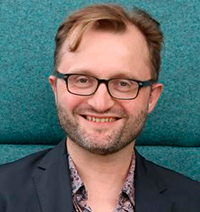The Welfare State Gone Wrong
by Lasse Horne Kjældgaard, Roskilde University
Abstract
There is a consensus within the social sciences that the Scandinavian welfare state represents a political and cultural paradigm that is unparalleled in certain respects. “Universalism”, “social citizenship”, “decommodification” and “defamilialization” are key words that are often used to describe what is special about this welfare state model. Many political controversies have revolved around the model, but it has also been negotiated with much fervour in post-war Scandinavian fiction. One genre, in particular, has been active in doing so: dystopias. Although the Scandinavian welfare state model has frequently been promoted as a “third way” and as a compromise to the ideological deadlock between capitalism and communism, also this model has prompted a number of notable dystopias, in fiction and non-fiction, and across different media and art forms. My talk will present a selection of these dystopias and see how they deal with some of the salient features of the Scandinavian welfare state model.
Lasse Horne Kjældgaard, Roskilde University
 Lasse Home Kjældgaard is Professor of Danish Literature at Roskilde University, Denmark, and Head of the research project Digitale Hovedstrømninger/Digital Currents. He has authored several monographs on Danish literary and cultural history, ”Meningen med velfærdsstaten: Da litteraturen tog ordet – og politikerne lyttede” (The Meaning of the Welfare State: When Writers Took the Stage – and Politicians Listened, 2018), ”Sjælen efter døden: Guldalderens moderne gennembrud” (The Soul after Death: The Modern Breakthrough of the Golden Age, 2007), and also co-authored a work on tolerance and fiction, ”Tolerance: Eller hvordan man lærer at leve med dem, man hader” (Tolerance: Or How You Learn to Live with Those You Dislike, 2007, translated into Swedish, 2012). He has also co-edited an introduction to literary theory and analysis, ”Litteratur: Introduktion til teori og analyse” (Literature. Introduction to Theory and Analysis, 2012, translated into Swedish 2014 and English 2017).
Lasse Home Kjældgaard is Professor of Danish Literature at Roskilde University, Denmark, and Head of the research project Digitale Hovedstrømninger/Digital Currents. He has authored several monographs on Danish literary and cultural history, ”Meningen med velfærdsstaten: Da litteraturen tog ordet – og politikerne lyttede” (The Meaning of the Welfare State: When Writers Took the Stage – and Politicians Listened, 2018), ”Sjælen efter døden: Guldalderens moderne gennembrud” (The Soul after Death: The Modern Breakthrough of the Golden Age, 2007), and also co-authored a work on tolerance and fiction, ”Tolerance: Eller hvordan man lærer at leve med dem, man hader” (Tolerance: Or How You Learn to Live with Those You Dislike, 2007, translated into Swedish, 2012). He has also co-edited an introduction to literary theory and analysis, ”Litteratur: Introduktion til teori og analyse” (Literature. Introduction to Theory and Analysis, 2012, translated into Swedish 2014 and English 2017).
